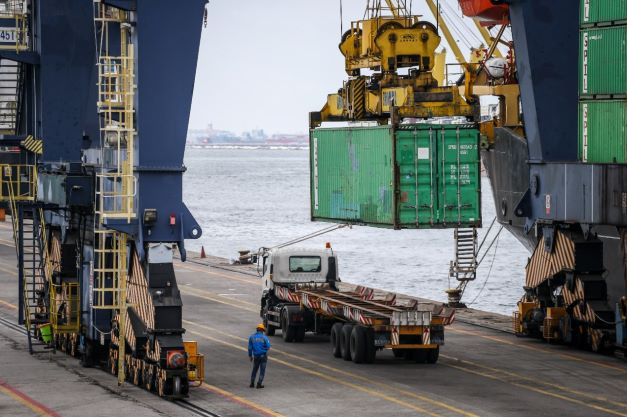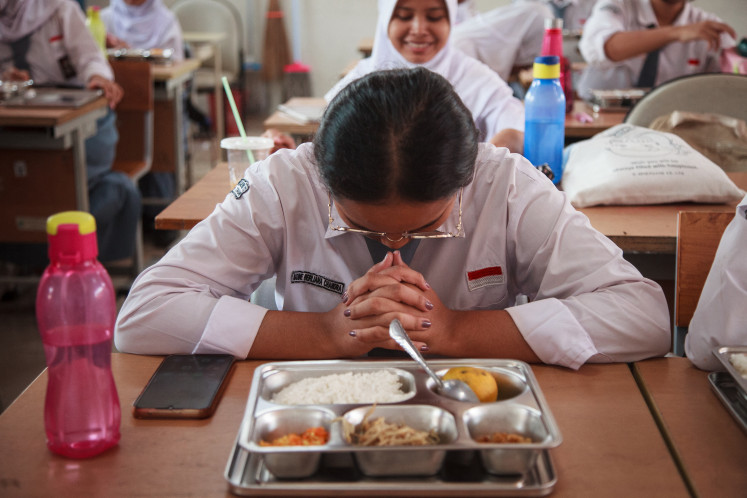Popular Reads
Top Results
Can't find what you're looking for?
View all search resultsPopular Reads
Top Results
Can't find what you're looking for?
View all search resultsSimplified customs rules to become effective on Jan. 1: Govt
The Customs and Excise Office has released a statement on a new ministerial regulation that becomes active on Jan. 1, 2023, as part of the government's efforts to simplify export procedures and boost trade.
Change text size
Gift Premium Articles
to Anyone
S
tarting on New Year's Day, the government is to enact updated export measures that simplify and modernize customs procedures in order to maintain the positive trade performance it achieved and maintained throughout 2022.
The measures are to take effect on Jan. 1, 2023 under Finance Minister Regulation (PMK) No. 155/PMK.04/2022 on customs procedures for the export sector, issued on Nov. 3 this year, which provides a clearer and firmer legal umbrella.
The new regulation also improves on the customs procedures for exports that were previously regulated in PMK No. 145/PMK.04/2007, which has been amended several times, with PMK No. 21/PMK.04/2019 being its most recent amendment.
In a statement explaining the new regulation from the ministry's Customs and Excise Directorate General released on Tuesday, Nirwala Dwi Heryanto, director of communication and service user guidance, said exports had played a very important role in supporting the national economy this year.
According to year-to-date (ytd) trade data from Statistics Indonesia (BPS), export performance showed a positive trend until November, recording 5.6 percent year-on-year (yoy) growth over that period.
Observing this data, the government had moved to create a more conducive export ecosystem through various means, one of which was to issue the new customs regulation.
“We are trying to provide legal certainty to improve customs supervision and services for the export sector by simplifying procedures and modernizing the system. Apart from that, this is one of our steps to support the acceleration of the national logistics ecosystem,” Nirwala said, as quoted in the statement.
He elaborated that the new regulation contained more specific provisions on the procedures for exporting goods, including a clearer mechanism for submitting the goods export notification (PEB), which could be carried out periodically for certain types of goods.
Other key provisions in the new regulation included those on export consolidation and the related obligations of freight companies, the mechanisms for the tracking and physical inspection of goods, and the loading and transportation of goods. These provisions were intended to support the efforts to improve the logistics system through the National Logistics Ecosystem (NLE).
Nirwala also said exporters were expected to understand and comply with the new regulation before it became active on Jan. 1. He added that individuals could public “directly contact the Bravo customs contact center” on any provisions that remained unclear.
The Bravo Contact Center can be reached by emailing info@customs.go.id or calling 1500225, according to the Customs and Excise Office website.
“We hope that the enactment of this regulation can provide a clear legal umbrella and ease of exports, [and will have] a positive impact on accelerating the flow of logistics and [developing] a conducive export ecosystem.
“Let us together support the government in boosting the economy by increasing national exports,” Nirwala said in the statement.
The latest BPS data showed that Indonesia’s trade was not as brisk as expected in November, when export growth shrank amid the continuing trade surplus. Exports that month grew 5.58 percent yoy to US$24.12 billion, the lowest growth recorded since November 2020.
Read also: RI trade performance cools amid continuing surplus
Since recording peak growth in June, exports have fallen 41 percent yoy as commodity prices stumble over fears of lower demand amid a possible global slowdown.
Import growth, meanwhile, has been declining steadily since August due to a fuel price hike that has hampered domestic consumption.
Exports and imports both fell on a monthly basis by respectively 2.46 percent and 0.91 percent.
Separately, BPS deputy head Muhammad Habibullah told reporters at a press conference on Dec. 15 that he hoped Indonesia would not experience a decline in capital goods imports
Indonesia maintained a trade surplus for the 31st consecutive month in November, exporting $5.15 billion more than it imported, higher than a surplus of $4.64 billion as forecast by state-owned lender Bank Mandiri, but slightly lower than the $5.30 billion projected by Moody’s Analytics.











